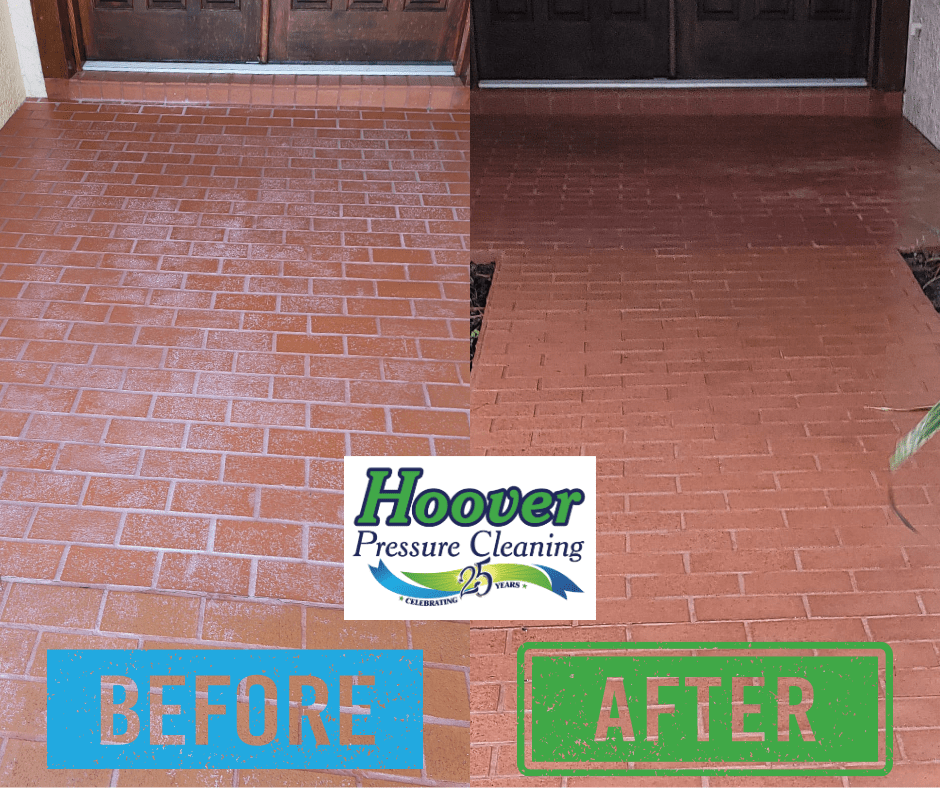When you invest in new pavers, whether it’s for your driveway, pool deck, or patio, sealing is one of the best ways to protect your surface and keep it looking beautiful for years. But there’s one critical step homeowners often rush past—allowing your pavers to fully cure before sealing them.
Skipping this waiting period can lead to trapped moisture, hazy finishes, or even sealer failure. At Hoover Pressure Cleaning, we’ve seen it all—and we want to help you avoid costly do-overs by understanding why patience pays off when it comes to sealing.
What Does “Curing” Mean?
When pavers are manufactured, moisture is mixed with cement, sand, and aggregates to form each brick. After installation, these pavers continue to release moisture and carbon dioxide as they dry—a process known as curing.
Even though your new patio might look ready after just a few days, it can take at least six weeks (sometimes longer depending on weather) for the pavers to completely cure. During this time, they’re still stabilizing and expelling moisture from within.
Why Sealing Too Soon Is a Mistake
Sealing pavers before they’re cured can cause more harm than good. Here’s what can happen when you don’t wait long enough:
1. Trapped Moisture
Curing pavers release moisture through microscopic pores. When you apply a sealer too early, that moisture gets trapped beneath the surface. Over time, it can create white, cloudy patches, known as blushing or hazing, making your pavers look uneven and dull.
2. Efflorescence Problems
Efflorescence—the white, chalky substance you sometimes see on new pavers—is a natural salt that rises to the surface as water evaporates. If you seal too soon, you lock that salt beneath the coating. As it tries to escape, it pushes against the sealer, causing bubbles, flakes, and discoloration.
3. Poor Adhesion
f the surface still contains moisture, the sealer can’t properly bond to the paver. This weakens the coating, making it more likely to peel or wear off prematurely. That means you’ll have to strip and reseal—doubling your cost and frustration.
How Long Should You Wait?
The general rule of thumb is to wait at least 6 weeks after installation before sealing, but a few factors can affect timing:
- Climate and humidity: In humid or rainy environments (like right here in Southwest Florida), curing takes longer.
- Type of paver: Concrete pavers cure slower than clay or natural stone.
- Drainage and airflow: Poor drainage or shaded areas retain more moisture, delaying curing.
At Hoover Pressure Cleaning, we always test your pavers before sealing by performing a simple water test—a small splash of water should absorb evenly instead of beading up. This tells us the paver is dry enough for a proper bond.
Why Proper Curing Leads to Better Sealing Results
When pavers are fully cured, sealing delivers the results homeowners love:
- Deeper, richer color: Sealers enhance the natural tones of your surface.
- Longer-lasting protection: A properly cured surface allows even absorption and maximum bonding strength.
- Reduced maintenance: Dirt, oil, and mildew have a harder time sticking to sealed pavers.
- Resistance to salt and weather damage: Especially important for Florida homes near the coast.
By waiting for the right moment, you’re not just sealing the surface—you’re preserving your investment.
The Hoover Difference
At Hoover Pressure Cleaning, we take pride in being plant-friendly, people-focused, and professionally trained. We use high-quality, environmentally responsible sealers from Deco Products—a trusted manufacturer with over 35 years of experience in concrete and paver protection.
Our technicians are trained to identify when pavers are ready to be sealed, ensuring you get a long-lasting, beautiful finish without the pitfalls of premature application. We clean, re-sand when needed, and apply sealer the right way—so you can enjoy a surface that’s protected, breathable, and vibrant.
Final Thoughts
Sealing your pavers too soon can lead to frustration and unnecessary expense, but taking the time to let them cure properly ensures you get the most out of your investment. The wait is worth it—your pavers will thank you with a stronger, longer-lasting finish and stunning curb appeal.
If you’ve recently had new pavers installed and want expert advice on the best time to seal, call Hoover Pressure Cleaning today. We’ll evaluate your surface, check moisture levels, and make sure your pavers are sealed the right way—safely and beautifully.
📞 Call or text Hoover Pressure Cleaning at (941) 697-6886
🌐 Visit www.HooverPressure.com
Because at Hoover Pressure Cleaning, we’re plant-friendly people who make your home shine—from the roof to the street!

